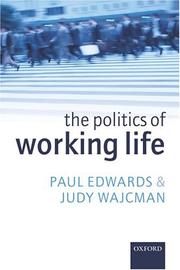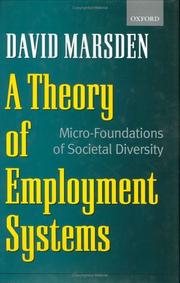| Listing 1 - 6 of 6 |
Sort by
|
Book
ISBN: 9781583674635 1583674632 9781583674642 1583674640 1583674667 1583674659 9781583674666 9781583674659 Year: 2014 Publisher: New York, New York
Abstract | Keywords | Export | Availability | Bookmark
 Loading...
Loading...Choose an application
- Reference Manager
- EndNote
- RefWorks (Direct export to RefWorks)
"For every person who reads this text on the printed page, many more will read it on a computer screen or mobile device. It's a situation that we increasingly take for granted in our digital era, and while it is indicative of the novelty of twenty-first-century capitalism, it is also the key to understanding its driving force: the relentless impulse to commodify our lives in every aspect. Ursula Huws ties together disparate economic, cultural, and political phenomena of the last few decades to form a provocative narrative about the shape of the global capitalist economy at present. She examines the way that advanced information and communications technology has opened up new fields of capital accumulation: in culture and the arts, in the privatization of public services, and in the commodification of human sociality by way of mobile devices and social networking. These trends are in turn accompanied by the dramatic restructuring of work arrangements, opening the way for new contradictions and new forms of labor solidarity and struggle around the planet. Labor in the Global Digital Economy is a forceful critique of our dizzying contemporary moment, one that goes beyond notions of mere connectedness or free-flowing information to illuminate the entrenched mechanisms of exploitation and control at the core of capitalism. "--
Information technology --- Capitalism --- Work --- Marxian economics. --- #SBIB:316.334.2A554 --- #SBIB:316.334.2A300 --- Marxist economics --- Communism --- Schools of economics --- Socialism --- Social aspects. --- Partijen en strategieën in de onderneming: technologische verandering en zijn effecten op structuur en inhoud van de arbeidsposten --- Arbeidssociologie: arbeidsmarkt en werkloosheid: algemeen --- Marxian economics --- Social aspects --- E-books
Book
ISBN: 9781469630670 1469630672 9781469630656 1469630656 1469630664 9781469630663 9798890847942 Year: 2016 Publisher: Chapel Hill
Abstract | Keywords | Export | Availability | Bookmark
 Loading...
Loading...Choose an application
- Reference Manager
- EndNote
- RefWorks (Direct export to RefWorks)
This work explains how and why Americans still cling to work as a solution rather than a problem - why it is that both liberals and conservatives announce that 'full employment' is their goal when job creation is no longer a feasible solution for any problem, moral or economic. The result is a stirring denunciation of the ways we think about why we labour, exhorting us to imagine a new way of finding meaning, character, and sustenance.
Employees --- Work --- Industry (Psychology) --- Method of work --- Work, Method of --- Human behavior --- Labor --- Occupations --- Work-life balance --- Laborers --- Personnel --- Workers --- Persons --- Industrial relations --- Personnel management --- Attitudes --- Social aspects --- E-books --- Attitudes. --- #SBIB:316.334.2A300 --- #SBIB:316.334.2A60 --- #SBIB:328H31 --- Arbeidssociologie: arbeidsmarkt en werkloosheid: algemeen --- Economische sociologie --- Instellingen en beleid: VSA / USA

ISBN: 0199271917 0199271909 9780199271900 9780199271917 9786610757770 0191556696 1280757779 1423770846 9780191556692 9781423770848 9781280757778 6610757771 Year: 2005 Publisher: [Place of publication not identified] Oxford University Press
Abstract | Keywords | Export | Availability | Bookmark
 Loading...
Loading...Choose an application
- Reference Manager
- EndNote
- RefWorks (Direct export to RefWorks)
How does the politics of working life shape modern organizations? Is our desire for meaningful, secure work increasingly at odds with corporate behaviour in a globalized economy? Does the rise of performance management culture represent an intensification of work, or create opportunities for the freewheeling individual career? This timely and engaging book, by leading authorities in the field, adopts the standpoint of the 'questioning observer'. It is for those who need an informed account of work that is accessible without being superficial. The book is unique in its multi-dimensional approach, weaving together analysis of individual work experience, political processes in organizations, and the wider context of the social structuring of markets. The book identifies central questions about working experience and answers them in a direct and lively manner. It has a strong analytical foundation based on a political economy framework, giving particular weight to the contradictory character of organizations. These contradictions turn on the competing demands placed on organizations and the different political projects of groups within them.; This perspective integrates the chapters, and permits numerous scholarly debates to be addressed - including those on identity projects, gender and work, power and participation, escalation in decision-making, and the meaning of corporate social responsibility. This book is suitable for undergraduate and graduate classes in Organizational Behaviour, Business Strategy and the Sociology of Work and Employment. It will also appeal to the general reader interested in grappling with the complexity of the changing environment of work.
Work. --- Capitalism. --- Travail --- Capitalisme --- Work --- Capitalism --- #SBIB:316.334.2A10 --- #SBIB:316.334.2A300 --- #SBIB:316.334.2A500 --- 316.2 --- arbeidssociologie --- organisatiesociologie --- 331.5 --- Arbeids-, bedrijfs- en economische sociologie: algemeen --- Arbeidssociologie: arbeidsmarkt en werkloosheid: algemeen --- Organisatiesociologie: algemeen --- sociologie van de arbeid --- Arbeidsmarkt. Werkgelegenheid --(algemeen) --- Labor & Workers' Economics --- Business & Economics --- 331.5 Arbeidsmarkt. Werkgelegenheid --(algemeen) --- Market economy --- Industry (Psychology) --- Method of work --- Work, Method of --- Human behavior --- Labor --- Occupations --- Work-life balance --- Economics --- Profit --- Capital --- E-books
Book
ISBN: 0814777392 0814776353 1441615687 0814776299 9780814776292 9780814776353 0814776914 9780814776919 9781441615688 9780814777398 Year: 2009 Publisher: New York, NY
Abstract | Keywords | Export | Availability | Bookmark
 Loading...
Loading...Choose an application
- Reference Manager
- EndNote
- RefWorks (Direct export to RefWorks)
2009 Choice Outstanding Academic TitleIs job insecurity the new norm? With fewer and fewer people working in steady, long-term positions for one employer, has the dream of a secure job with full benefits and a decent salary become just that—a dream?In Nice Work If You Can Get It, Andrew Ross surveys the new topography of the global workplace and finds an emerging pattern of labor instability and uneven development on a massive scale. Combining detailed case studies with lucid analysis and graphic prose, he looks at what the new landscape of contingent employment means for workers across national, class, and racial lines—from the emerging “creative class” of high-wage professionals to the multitudes of temporary, migrant, or low-wage workers. Developing the idea of “precarious livelihoods” to describe this new world of work and life, Ross explores what it means in developed nations—comparing the creative industry policies of the United States, United Kingdom, and European Union, as well as developing countries—by examining the quickfire transformation of China’s labor market. He also responds to the challenge of sustainability, assessing the promise of “green jobs” through restorative alliances between labor advocates and environmentalists.Ross argues that regardless of one’s views on labor rights, globalization, and quality of life, this new precarious and “indefinite life,&” and the pitfalls and opportunities that accompany it is likely here to stay and must be addressed in a systematic way. A more equitable kind of knowledge society emerges in these pages—less skewed toward flexploitation and the speculative beneficiaries of intellectual property, and more in tune with ideals and practices that are fair, just, and renewable.
Employment in foreign countries. --- Foreign workers. --- Globalization. --- Global cities --- Globalisation --- Internationalization --- Alien labor --- Aliens --- Foreign labor --- Guest workers --- Guestworkers --- Immigrant labor --- Immigrant workers --- Migrant labor (Foreign workers) --- Migrant workers (Foreign workers) --- Employment, International --- Employment, Overseas --- Foreign employment --- International employment --- Overseas employment --- Working abroad --- Working overseas --- Employment --- International relations --- Anti-globalization movement --- Employees --- Vocational guidance --- Employment in foreign countries --- Foreign workers --- Globalization --- #SBIB:316.334.2A300 --- Arbeidssociologie: arbeidsmarkt en werkloosheid: algemeen --- Noncitizen labor --- Noncitizens --- become. --- exploration. --- living. --- making. --- now. --- penetrating. --- precarious. --- such. --- task. --- temps.

ISBN: 0198294239 0198294220 0191596612 1281970689 9786611970680 019152221X 9780198294221 9780198294238 9780191522215 Year: 1999 Publisher: Oxford Oxford University Press
Abstract | Keywords | Export | Availability | Bookmark
 Loading...
Loading...Choose an application
- Reference Manager
- EndNote
- RefWorks (Direct export to RefWorks)
This text examines why there are such international differences in the way employment relations are organized within the firm. It aims to explain why firms and workers should use employment relationship as the basis for their economic co-operation.
Labour market --- Personnel management --- Job analysis. --- Occupations --- Diversity in the workplace. --- Emplois --- Professions --- Multiculturalisme en milieu de travail --- Classification. --- Analyse --- Classification --- Job analysis --- Diversity in the workplace --- Electronic books. -- local. --- Occupations -- Classification. --- Commerce --- Business & Economics --- Marketing & Sales --- -#SBIB:316.334.2A300 --- #SBIB:316.334.2A553 --- Career patterns --- Careers --- Jobs --- Trades --- Handicraft --- Vocational guidance --- Work --- Analysis, Job --- Job evaluation --- Cultural diversity in the workplace --- Cultural diversity in workforce --- Diversity in the workforce --- Diversity in the work place --- Multicultural diversity in the workplace --- Multicultural workforce --- Workforce diversity --- Multiculturalism --- Arbeidssociologie: arbeidsmarkt en werkloosheid: algemeen --- Personeelsbeleid en loonbeleid, functieclassificaties --- Job classification --- Labor classification --- Position classification --- #SBIB:316.334.2A300 --- E-books --- Occupations - Classification
Book
ISBN: 1472505751 1472510399 9781472505750 9781472510396 1472510631 1472508475 1472507983 9781472508478 Year: 2014 Publisher: London Bloomsbury
Abstract | Keywords | Export | Availability | Bookmark
 Loading...
Loading...Choose an application
- Reference Manager
- EndNote
- RefWorks (Direct export to RefWorks)
"Guy Standing's immensely influential 2011 book introduced the Precariat as an emerging mass class, characterized by inequality and insecurity. Standing outlined the increasingly global nature of the Precariat as a social phenomenon, especially in the light of the social unrest characterized by the Occupy movements. He outlined the political risks they might pose, and at what might be done to diminish inequality and allow such workers to find a more stable labour identity. His concept and his conclusions have been widely taken up by thinkers from Noam Chomsky to Zygmunt Bauman, by political activists and by policy-makers. This new book takes the debate a stage further-looking in more detail at the kind of progressive politics that might form the vision of a Good Society in which such inequality, and the instability it produces is reduced. A Precariat Charter discusses how rights - political, civil, social and economic - have been denied to the Precariat, and at the importance of redefining our social contract around notions of associational freedom, agency and the commons. The ecological imperative is also discussed - something that was only hinted at in Standing's original book but has been widely discussed in relation to the Precariat by theorists and activists alike"--Bloomsbury Publishing.
Precarious employment. --- Work. --- Occupy movement. --- Social policy. --- National planning --- State planning --- Economic policy --- Family policy --- Social history --- Protest movements --- Industry (Psychology) --- Method of work --- Work, Method of --- Human behavior --- Labor --- Occupations --- Work-life balance --- Employment, Precarious --- Social problems --- Sociology of work --- Community organization --- Income --- Social law. Labour law --- Social security law --- #SBIB:316.334.2A300 --- #SBIB:316.334.2A470 --- #SBIB:324H74 --- Arbeidssociologie: arbeidsmarkt en werkloosheid: algemeen --- Arbeidssociologie: het sociaal-economisch overheidsbeleid: algemeen --- Politieke verandering: sociale bewegingen --- Precarious employment --- Work --- Occupy movement --- Social policy --- Non-standard employment --- Industrial arbitration and negotiation --- Globalization --- Central / national / federal government policies
| Listing 1 - 6 of 6 |
Sort by
|

 Search
Search Feedback
Feedback About UniCat
About UniCat  Help
Help News
News